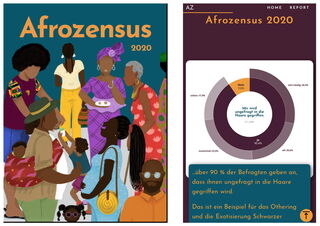Bias
Children of Color Experience Racism in German Schools
Racism is an international problem, affecting even our children.
Posted February 28, 2022 Reviewed by Ekua Hagan
Key points
- In a survey of one million Black Germans, 90.4% said that others touched their hair without asking, which 48.4% said happens often.
- Children need to learn that unwanted touching is never ok. Violation of this integrity is technically assault, which is not defined by intent.
- Dismissing unwanted hair touching teaches kids if they are touched by someone else, no one will help, setting them up for later abuse.
by Sonya Faber, Ph.D., and Monnica Williams, Ph.D., ABPP
I am an African American who has lived in Germany for many years and my multi-citizenship children have attended rigorous international IB schools in Berlin. These venues are international but unfortunately still suffer from American ideas about race and gender, which co-exist and overlap with German ideas about who is a native, who is not, and the meaning of skin color.
Although there are over a million Black people in Germany, the concept of identity, nationality, and ethnicity remains unsettled and often unexamined, in deference to an empty notion of “colorblindness” that only hides the underlying racism that infects the history of both countries and seeps, unwanted into the present.
The murder of George Floyd in 2020 has led to a global re-examination of assumptions about racism, in particular anti-Black racism, and as such, it is useful to turn an eye to the experience of the next generation and see what this can tell us about how far we have come and what remains.

Racism Is an International Problem
My children attended an English-language integrated IB school in Berlin Mitte with a mixed German, primarily White, English-speaking international study body, but with disproportionately low BIPOC faculty, with many instructors from the US or English-speaking countries. The school did not understand the ways in which non-White and non-cis-gendered students were stigmatized and racialized by their peers and how this contributed to bullying at the school and, at times, an atmosphere hostile to learning.
Racialization and Bodily Integrity
My daughter has thick, curly hair. Here is one episode of racism she vividly remembers (Kanter et al., 2018):
People would routinely touch, grab, and pull my hair. When I would turn around in shock, they would smile at me and say, “I just love your hair.” I always felt too embarrassed to stand up for myself and thought it would be wrong to do so since it would happen in front of many others and even teachers who felt this was ok.
Everyone has the right to bodily integrity. Violation of this integrity is technically assault, and children need to learn that unwanted touching is never ok. The biggest problem with this type of assault is that those in power, i.e., teachers and administrators in schools, tend to dismiss it as teasing, but it is ultimately an issue of power. It sends a message that certain students are allowed to violate others, and it demonstrates public ownership of something that should belong to the individual alone. It also teaches children that if they are touched by someone else, no one will do anything to help, setting them up for abuse in later life. Fighting back against this kind of assault is difficult because when it is hiding in a seeming compliment: “I love your hair.” The kids who touch hair are defended with claims that they did not intend to do any harm.
Assault, however, is not defined by intent. Therefore, the dismissal of this violation is a second crime piled atop the first by legitimizing the assault. It sends a sign that some students are less valuable, can be assaulted in public, and nothing will be done to prevent it.

There has been much written about why one should not touch people’s hair, and this seems to be a problem experienced largely by Black people (although certainly, anyone with very curly hair could experience this). The results of a sponsored census of the one million Black Germans of African descent were recently released and confirmed the persistence anti-Black racism in Germany. In the recently published Afrozensus report, for example, 79% said that others told them, "Go back where you came from." And interestingly, 90.4% said that others touched their hair without asking, which 48.4% said happens often.
Racism in Schools Harms Children
My child’s teachers tended to treat this behavior as largely harmless, but it is not. Racism in schools can cause behavioral problems in children, low self-esteem, and academic disengagement (Steketee et al., 2021). Like bullying, even small acts can be problematic if they are ongoing (Williams et al., 2018).
Teachers are in a unique and privileged position to be an influence for good in the lives of children. They can help reverse the course of a society rife with invisible racism and overflowing in White privilege. All teachers should inform themselves about how racism might appear in the classroom and advocate for racial justice (Steketee et al., 2021). Everyone, but especially teachers, should support the bodily integrity of all children.
References
Steketee, A., Williams, M., Valencia, B., Printz, D., & Hooper, L. M. (2021). Racial and language microaggressions in the school ecology. Perspectives on Psychological Science, 16(5), 1075-1098. https://doi.org/10.1177/1745691621995740
Aikins, M. A., Bremberger, T., Aikins, J. K., Gyamerah, D., Yıldırım-Caliman, D. (2021) Afrozensus 2020: Perspektiven, Anti-Schwarze Rassismuserfahrungen und Engagement Schwarzer, afrikanischer und afrodiasporischer Menschen in Deutschland, Berlin. Berlin: Citizens for Europe. https://afrozensus.de/reports/2020/
Kanter, J. W., Williams, M. T., Kuczynski, A. M., Manbeck, K., Debreaux, M., & Rosen, D. (2017). A preliminary report on the relationship between microaggressions against Blacks and racism among White college students. Race and Social Problems, 9(4), 291-299. doi: 10.1007/s12552-017-9214-0
Williams, M. T., Printz, D., & DeLapp, R. C. T. (2018). Assessing racial trauma in African Americans with the Trauma Symptoms of Discrimination Scale. Psychology of Violence, 8(6), 735-747. https://doi.org/10.1037/vio0000212


